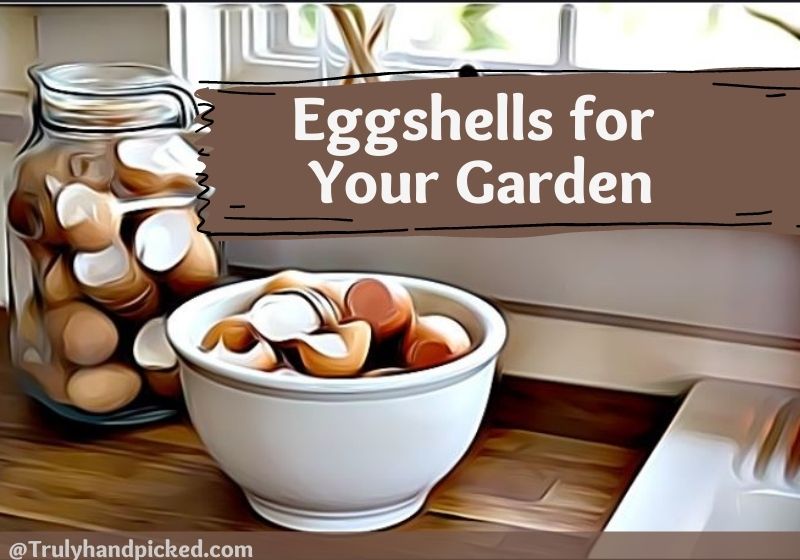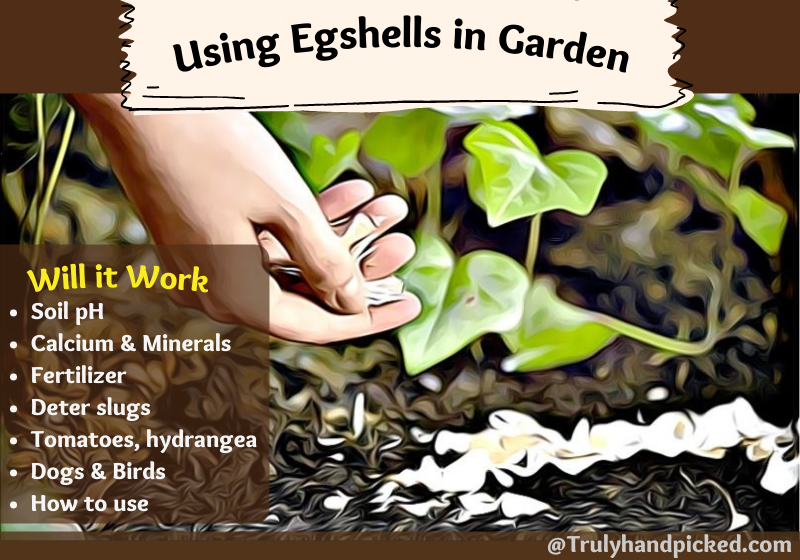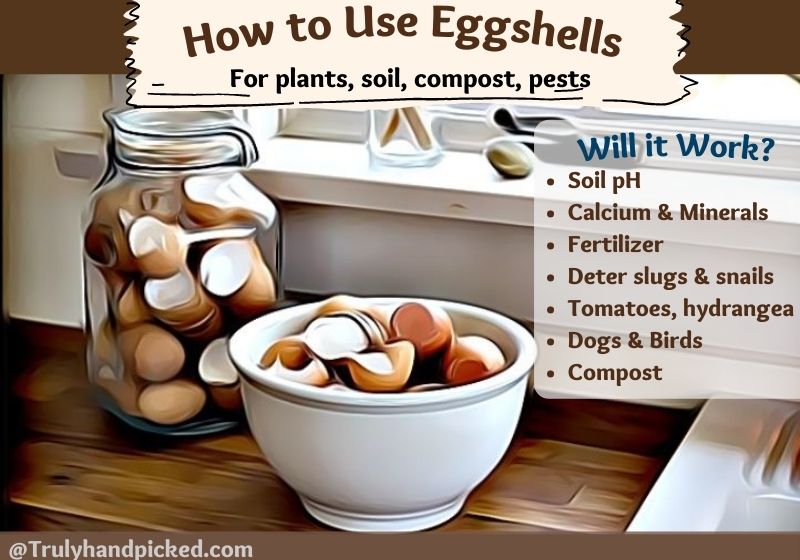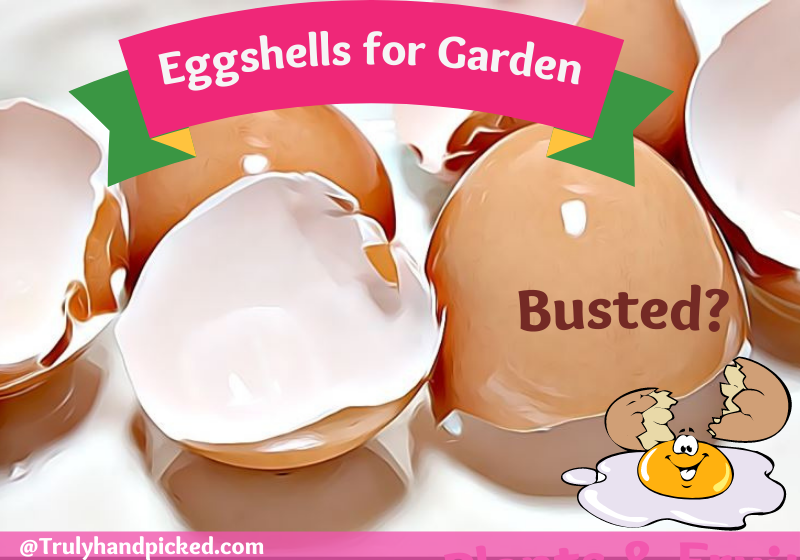We always throw the eggshells in a trash bin after using the white and yolk, which makes tons and tons of shells end in landfills. But do you have any idea how much nutrients those crunchy eggshells hold in themselves?
Well, once you realize that an eggshell is a powerhouse of calcium, potassium, and phosphoric acid, you will understand the value of this common house waste.
Eggshells can be of great use for fertilizing your planting soil and for a happier and more successful gardening experience. Let’s learn how we can recycle eggshells in the garden to make our plants a bit more thriving natural-
Why Use Eggshells In Your Garden:
You can utilize eggshells for gardening in several ways
- To neutralize soil pH and as a soil amendment
- Organic fertilizer
- As a seedling cup
- Good to enrich your compost pile
- For mulching
- To make organic pesticides and as a natural pest deterrent
- To combat blossom end rot of some plants
- Plants like tomato, eggplant, cauliflower, peppers, and spinach love egg shell as fertilizer
- Good to be recycled and used in chicken or bird feed
- Crushed eggshells are good in a potting mix for texture and aeration

How to Prepare Eggshell Tea for Your Plants
To prepare and use eggshells tea you need to follow these steps-
- Take 2-3 tbsp of totally crushed eggshells in a saucepan
- Add 1 tbsp of Epsom salt to the pan
- Take 3-4 liters of filtered water into that pan as well
- Set the pan on your gas stove until the water starts boiling
- Now, turn the heat off and cover the pan with a lid immediately
- Let the eggshells steep in the water for 24 hours by covering the pan this way
- After a certain period, strain the water into a spray bottle and store it in a cool & dry place of your house for several days
- Use it by sprinkling it on any of your plants once or twice a month to provide your favorite plant a growing boost naturally.

How to Use Eggshells as Organic Fertilizer:
You can prepare an amazing organic calcium-boosting fertilizer for your planting soil out of some handfuls of eggshells.
Eggshells contain a decent amount of sulfur along with other nourishing minerals and soil pH-neutralizing compounds. Thus, it can make a great organic fertilizer for your garden soil.
A good amount of sulfur along with a good proportion of calcium and potassium can help to grow your plants more vigorously while adding it to your planting soil. You just need to follow these steps before using them as a fertilizer-
- Wash and dry them thoroughly
- Make fine dust out of the properly dried eggshells
- Now, add the eggshell dust to the garden soil directly
- You can even put some pieces of eggshells as well at the bottom of a planter before placing fertilized soil into it to get the same outcome for your plant.
Related: Organic fertilizers – how to make organic plant food.
How to Prepare: Collect, Dry, and Grind Eggshells:
Now, let’s learn how to collect, dry, and ground eggshells like an expert gardener through this step by step instructions-
1. Collect:
- Keep an individual trash bin to throw your eggshells only after using the inside part of each egg
- It will be better if you can give them a good wash under running water, before throwing them into the recycle bin
- Once you have gathered a good number of eggshells in your bin, go through the dry process instantly
2. Dry:
- To dry collected eggshells, place them on a large platter separately
- Keep the plate or platter under direct sunlight for one or two days consistently
- You can also put them on a cookie sheet in a single layer and microwave them for a quick-drying experience
- You need to microwave fully-washed eggshells for almost 30 minutes on a low heat of 250-275 degrees F in this attempt
3. Grind The Eggshells :
- Once the eggshells are dried properly, place them in your grinder and grind them until they turn into a smooth dust
- Or place the dried eggshells into a stone-made mortar pestle
- Now, Crush the shells with the pestle until they turn into a fine powder, and add them to your planter or garden soil directly.

How to Use Eggshells for Tomato Plants
Few gardeners disagree with the concept of adding eggshells to tomato plants for BER, as blossom end rot is more of a watering issue than calcium.
But, using crushed eggshells in your pot or garden soil for tomato plants is going to help the soil’s pH. Which in turn aids in better water absorption and prevents BER. Yet, watering at regular intervals is another key factor.
- Add a dozen of crushed/powdered eggshells to your pot or tomato grow bag or dig a few inches deep and sprinkle the eggshell powder.
- Cover it with compost or garden soil. Eggshells take a little longer to decompose and be readily available for plants rather than calcium carbonate tablets.
- Also adding eggshells to your potted plants in crushed form adds mass to your soil. Also, it helps to keep the soil well-drained, loose, and aerated rather than soggy.
How to Use Eggshells in Compost: Can eggshells be composted?
Yes! using eggshells in compost can help you immensely in gardening like-
- Eggshells in your compost pile can increase the calcium level of compost naturally
- An eggshell-rich compost will help your plant to build cell walls more quickly and efficiently
- Using eggshells in your compost mix also helps to carry adequate nutrients to the roots more effectively
- Besides, eggshell-rich compost prevents the problem of bloom-end rot of some cropping plants resourcefully like tomatoes, squash, etc.
- Don’t forget to rinse, dry, and crush before adding it to your compost, as may turn stinky or even invite unwanted pests and guests.
Related: How to use mushroom compost

Do Eggshells Use to Deter or Repel Slugs and Snails?
The sharp edges of crush-sprinkled eggshells can help deter slugs and snails from your indoor or outdoor plants easily. Also, the adhesive quality of eggshells keeps such hermaphroditic animals as snails and slugs away from your garden plants.
- Take some dry eggshells in a contain and crush them roughly with your hand or pestle
- Make sure you left the sharp edges of crushed eggshells unground in this process
- Now, fling those roughly crushed eggshells around the planting soil in a circular pattern
Be certain that eggshells are visible in your planter and see how easily you can get rid of those stubborn snails or slugs without any expensive deterrent.
Do Eggshells Attract Rodents?
Eggshells are not only highly nutritious but delicious too for rodents like rats. Being a good source of calcium, they are beneficial as well for the health of such rodents. Yes, egg residue on the eggshells is capable of attracting rodents effortlessly to your garden. So, wash and dry thoroughly before adding the crushed eggshells to your soil or compost.
Eggshells for Birds:
You can even help a bird by feeding it leftover eggshells in the birdfeeder of your garden. As we mentioned several times that eggshells are rich in calcium, and this nutrient helps some birds to find their required nutrients from these crunchy eggshells.
Try to wash eggshells thoroughly and dry them in your microwave, before putting them into the birdfeeder to give the birds a preferable treat. Blue-grey gnatcatchers, robins, northern orioles, scarlet tanagers, tree swallows, etc. are some birds, which like eggshells the most to eat.
Which Plants Like Eggshells?
The nutrients part of eggshells makes them valuable for almost every plant. However, some plants are more attracted to the neutralizing part of eggshells than others. They are like-
- Tomatoes
- Eggplants
- Squash
- Broccoli
- Cauliflower
- Swiss Chard
- Spinach
- Peppers, etc.
Are Eggshells Good for Dogs?
Despite being a good source of calcium, you should avoid giving eggshells in the food bowl of your pet dog. Eggshells have sharp edges that can cause mouth injuries to your dog. Besides, unlike rodents and birds, dogs don’t find eggshells as tasty as other food. So, you must find a better option to include calcium in your dog food instead of eggshells.
Mulching with eggshells
If are able to collect a lot of it, then you wash it dry and crush them to be used as mulching material in your garden. Apart from the above-mentioned soil stabilizing and enriching factors, it looks beautiful around your plants with its contrasting color to the soil.
Eggshells for hydrangea: Getting Pink and Blue Hydrangeas
Pink Hydrangea with eggshells
Adding eggshells to your soil for hydrangea plants will help the plant with its calcium and phosphorous needs. Apart from nutrients, as we know eggshells slowly change the soil pH. When your acidic soil pH turns neutral or little alkaline it will make your hydrangeas bloom pink.
Blue Hydrangea with acidic soil and aluminum sulfate.
While using a small cup of vinegar (apple cider vinegar) in a gallon of water will make your soil a little acidic. This helps to keep your hydrangeas blue.
Moreover, you can also use 1 tbsp of aluminum sulfate in one gallon of water for your hydrangeas will boost the blue color blooms. Please note hydrangeas are an exception while adding vinegar to your soil can kill other set plants in that spot or pot.
Eggshells as soil Neutralizer:
An eggshell contains various amounts of soil-neutralizing compounds like-
- Calcium carbonate
- Potassium
- Zinc
- Iron
- Magnesium
- Phosphorus
- Copper
- And sodium
Adding crushed eggshell power to soil can reduce the acidity level (Need boxes of crushed and powered eggshell) and bring balance to the pH level of your garden soil naturally.
These properties make eggshells an asset for your garden soil. This will not only neutralize your planting soil but at the same time work for the soil amendment too.
So, if you are a home gardener, stop wasting your money on expensive neutralizers to make your garden soil more productive, and start using this simple yet natural soil neutralizer right away.
You can use eggshells to prepare eggshells tea as well. Sprinkle some eggshell tea once a month can boost the growth of your plant immensely along with neutralizing them deeply.